Flying and Fighting with VMF-323

Marine Fighting Squadron 323 (VMF-323) was commissioned on August 1, 1943, and was quickly brought up to combat-ready status under the leadership of young Maj. George Axtell Jr. Instilling great discipline and aggressive fighter tactics, the men of VMF-323 certainly earned their squadron’s nickname as the “Death Rattlers.” At the controls of the F4U and FG-1 Corsairs, the men of VMF-323 not only provided ground support for the island-hopping Marines below but also shot down more than 124 Japanese planes. Here is the story of three such men who, by their own accounts, were each “just doing my job.”
Maj. Gen. George C. Axtell Jr., USMC, Ret. “When I was promoted to the rank of major in 1943 and given command of a Marine fighter squadron, VMF-323, at the ripe old age of 22, I suddenly became the youngest squadron commander in the Marine Corps. I may have been tough and hard on them and had very little patience for screwups, but my role as CO [commanding officer] was not to make friends. My role was to mold boys into men, creating the deadliest, most highly trained fighter pilots in the world at the controls of the Corsair.
“To me, the Corsair was the nicest fighter I had flown at the time, even better than the F6F Hellcat. The F4U was very smooth; steady; and a delightful, stable gun platform. We could also carry a large assortment of ordnance, including napalm, rockets, and bombs, as we supported the Marines on the ground during the island-hopping campaign.
This story is from the June 2019 edition of Flight Journal.
Start your 7-day Magzter GOLD free trial to access thousands of curated premium stories, and 9,000+ magazines and newspapers.
Already a subscriber ? Sign In
This story is from the June 2019 edition of Flight Journal.
Start your 7-day Magzter GOLD free trial to access thousands of curated premium stories, and 9,000+ magazines and newspapers.
Already a subscriber? Sign In

Keeping 'em Flying!- The new generation of warbird pilots, restorers and mechanics
The new generation of warbird pilots, restorers and mechanics. Nearly 80 years after the end of World War II, the fighters, bombers, and trainers that defended freedom continue to enthrall and inspire audiences at airshows, thanks to generations of warbird pilots, maintainers, restoration specialists and collectors. In our September, 2022 issue we introduced you to the young warbird pilots, maintainers and restorers who are already beginning to displace more "experienced" warbird fliers and fixers.

The Corsair Maker- Bringing the Vought Corsair to the fleet was a daunting challenge that spanned nearly three years.
When the first production Corsairs exited the Stratford factory in June 1942, Guyton, as seen here, was tapped to manage the flight and production test program. Armament was improved to six wing-mounted .50s, displacing the wing fuel tanks now placed forward of the cockpit which necessarily was moved rearward by 32 inches. Overall length was increased, armor plate added, landing, arresting and tail gear improved, aileron control enhanced, and a new version of the R2800 engine was incorporated. But those significant improvements unearthed numerous idiosyncrasies that would take an extended period to make the Corsair acceptable for carrier operations
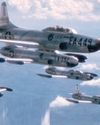
STARFIRES Over Korea
F-94 pilots tangle with MiGs
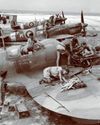
Training Mission
BY THE TIME THIS TRAINING SCENE WAS RECORDED in Canne, Italy, in July 1944, Allied Yugoslavian airmen had several years of experience working side by side with the RAF.
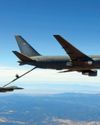
KC-46A PEGASUS
Next generation aerial refueler
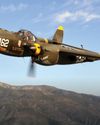
"SATAN'S ANGELS" ACE - Tales from a P-38 pilot in the South Pacific
\"AS A KID GROWING UP on the bow of my father's tugboat, hauling oil from Seattle to Alaska, I had a lot of time on my hands.
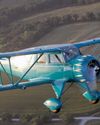
WACO YKC - Stunning and Ultra Rare Golden Age Cabin Flier
BETWEEN THE IMPLEMENTATION of the Air Commerce Act of 1926 and December 31, 1948, all U.S. registered flying machines sported an N-number, much as they do today, the \"N\" being an internationally recognized identifier for the United States. During that period, however, an additional letter-identifier followed the \"N.\" Depending on their category, they were registered in the NC (Commercial), NG (Glider), NL (Limited), NR (Restricted, usually meaning race airplanes), NS (State government), and, finally, NX (experimental).
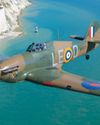
BADER'S HURRICANES
Double amputee fighter ace Douglas Bader and his Battle of Britain Hurricanes
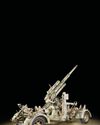
Scourge of the Allied Fighters
IT HAD TO BE THE MOST HELPLESS FEELING in the world: you're at 25,000 feet over Europe knowing that your primary function is to drop bombs-or flying escort for the bombers while being a slow-moving target for some of the world's finest shooters. However, you have John Browning's marvelous .50 caliber invention to give some degree of protection. Unfortunately, you're absolutely helpless against flak. Piloting and gunnery skills play no role in a game where sheer chance makes life and death decisions. For that reason, the Krupp 88 mm Flak 18/36/37 AA cannon could be considered WW II's ultimate stealth fighter. You never saw it coming.
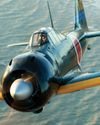
ZERO MYTH, MYSTERY, AND FACT
A test pilot compares the A6M5 Zero to U.S. fighters